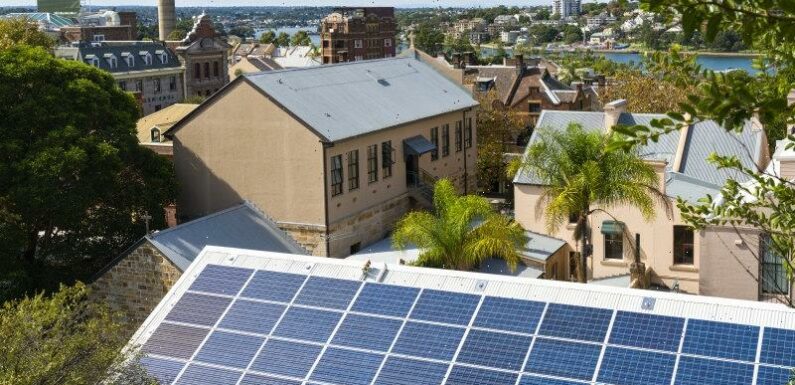
Australia is exposed to a looming shortage of solar and other renewable technology that will threaten the nation’s transition from coal and gas, Energy Minister Chris Bowen has warned in a pledge to invest billions of dollars in local manufacturing.
Soaring global demand for the advanced technology has sparked the concerns about energy security when China has increased its dominance in renewable production, leading the government to turn to strategic partners such as India to ensure reliable supplies.
Australians have bought 60 million solar panels over the past decade but relied on imports for 99 per cent of the total.Credit:Getty
The government is planning a $3 billion investment in clean energy components and other projects but needs support from the Greens to start the funding, raising the stakes in talks to pass new laws to cut greenhouse gas emissions and fund renewable technology.
Australians have bought 60 million solar panels over the past decade but relied on imports for 99 per cent of the total, with the government worried about how to secure another 60 million panels by 2030 to meet emission reduction targets.
Bowen will meet counterparts from India, Japan and the United States at a Quad energy ministers meeting later this year to cement alliances aimed at guaranteeing supplies and keeping costs down in Australia during the shift to renewable power.
“The whole world is now on this transition and supply chains are already tight,” Bowen told this masthead.
“But when supply chains are so concentrated, and getting more concentrated, the risk is greater every day, so this transition now is more important to us than it ever has been.
“It’s a risky matrix unless we build sovereign capability and have like-minded trading partners building capability and sovereignty at the same time.”
Bowen made the remarks in an interview ahead of a speech on Saturday to the Australian Strategic Policy Institute, where he will speak alongside the Indian Minister for External Affairs, Subrahmanyam Jaishankar, who is visiting Australia for the second time in six months.
China has invested more than $70 billion in photovoltaic supply since 2011, 10 times more than Europe, according to the International Energy Agency. It has created more than 300,000 manufacturing jobs across the solar supply chain over that time and has more than an 80 per cent share of the market for polysilicon, ingots, wafers, cells and modules.
That dominance has intensified concerns in Canberra about future supplies after years of tensions with China that saw it halt imports of Australian coal, barley, wine, lobster and other products. Chinese curbs on the export of AdBlue, a chemical added to diesel, disrupted the Australian trucking industry in 2021.
Bowen warns in his speech on Saturday about supply shortages for solar panels, inverters, transformers and batteries and emphasises the need for Australia to make more components while at the same time counting on India to scale up its manufacturing.
The energy security challenge is on the agenda for the Quad security dialogue, a peak forum for its four members – Australia, India, Japan and the United States – to deal with the rise of China.
Prime Minister Anthony Albanese will host US President Joe Biden, Indian Prime Minister Narendra Modi and Japanese Prime Minister Fumio Kishida at a Quad summit in Sydney in the middle of the year, while Bowen will meet energy ministers later this year.
With the global value of photovoltaic production worth more than $50 billion a year, according to the International Energy Agency, the government believes Australia can develop a viable local production capacity.
Bowen said he was “forward-leaning” on local manufacturing for components and said in battery production, for instance, Australia could do more of the processing of the critical minerals needed – such as lithium, cobalt, manganese, nickel and graphite – even if it did not create the full battery.
Industry Minister Ed Husic is negotiating with Greens leader Adam Bandt on the $15 billion National Reconstruction Fund, which would invest $3 billion for clean energy components, metal refining with renewable energy and other projects. Bandt wants the law to stop the fund investing in coal or gas projects.
Bowen named the reconstruction fund as part of the push for sovereign capacity and emphasised the need for a separate law to set up a “safeguard mechanism” to cut greenhouse gas emissions at 215 big emitters. The Greens also want this law to ban new coal or gas projects.
“Unless you get the safeguard mechanism in place for Australian businesses, they’re going to increasingly struggle to get capital,” Bowen said.
Asked about the security of gas supply, Bowen said this was “part of the equation” but Australia was a big producer of liquefied natural gas and was not forecast to be short of the fuel.
Asked if Australia needed new gas fields in future, he said: “I think you’ve got to keep that conversation going. But I’ve been very explicit and clear: gas is essential in the system to provide peaking and firming [in power stations] as we transition to renewables, and gas is essential for those industries for which green hydrogen has not yet emerged as a viable alternative.”
With the Greens calling for an end to new gas projects and to the use of gas over time, Bowen said Australia had to be realistic about a transition that was some years off.
“That means ensuring adequate gas supply, both for gas-fired power stations which are flexible at peaking and firming, and as feedstock [for manufacturing] – and suggestions that we don’t need to do that are unrealistic,” he said. “How much gas is in the system and where the supply will come from is an ongoing conversation.”
Cut through the noise of federal politics with news, views and expert analysis from Jacqueline Maley. Subscribers can sign up to our weekly Inside Politics newsletter here.
Most Viewed in Politics
From our partners
Source: Read Full Article
